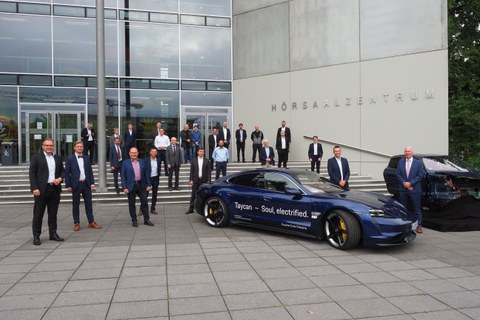Sep 17, 2021
Strengthened partnership for the connected electric vehicle of the future

Forschungskooperation zwischen TU Dresden und der Porsche AG: Vertreter der Porsche AG und der TU Dresden sowie Gäste. Im Zuge des Events stellte der Sportwagenhersteller den Forschenden der Fahrzeugmechatronik einen Porsche Taycan (vorn li.) inklusive Schnellladesystem sowie der Professur für Kraftfahrzeugtechnik ein Cockpit (hinten re.) für einen neuen Fahrsimulator zur Verfügung.
Research cooperation between Porsche AG and the Institute of Automobile Engineering Dresden (IAD) at TU Dresden
Dresden, 17 September 2021 – Mobility of the future is highly networked and electrified, as well as sustainable and efficient. Important political and economic foundations have been laid for this. Currently, however, there are still numerous challenges in the context of electromobility, such as a widely available charging infrastructure, high charging speeds and intelligent algorithms for future charging management.
Two strong players from the worlds of business and science who have been dedicated to e-mobility for years are Porsche AG and the Chair of Vehicle Mechatronics at the Institute of Automobile Engineering Dresden (IAD) of the "Friedrich List" Faculty of Transport and Traffic Sciences at TU Dresden. The two have already maintained a close exchange for 15 years.
With a research cooperation, the collaboration is now being taken to a new level. The framework agreement was signed this morning at TU Dresden. In the course of this event, the sports car manufacturer provided the researchers of vehicle mechatronics with a Porsche Taycan including a fast-charging system as well as a corresponding cockpit for a new driving simulator to the Chair of Automobile Engineering. This gives the TU Dresden a unique selling point in the German university landscape in this field.
Excellent research and teaching + young engineers for the economy
"Without the motivated, top-trained students here from Dresden, the many projects in the past would not have been possible. I am pleased that, in addition to the cooperation projects, we can make an important contribution to the education and fascination of our future generation of engineers with our numerous lectures at the IAD colloquia and conferences," said Dr. Oliver Seifert, Head of Electrical/Electronic Development at Porsche, in his opening speech.
"TU Dresden stands for excellent research and teaching and, especially as a technical university, for a high level of application orientation. We are pleased and very grateful for the great trust and support of Porsche AG, which we also see as recognition of our performance," said the Chancellor of TU Dresden, Dr. Andreas Handschuh, at the signing of the contract today.
For Prof. Bernard Bäker, Head of the Chair of Vehicle Mechatronics, the research cooperation with a partner like Porsche AG is the right way to tackle the numerous and multi-layered challenges of e-mobility of the future in connection with the climate and mobility turnaround and to find sustainable solutions for broad social usability: "This requires innovative approaches as well as creative ideas. Experienced experts and young professionals from industry and research are the basis for this. Research cooperations like the one signed today enable a close exchange between both sides and form fertile ground for new innovative developments."
At today's signing of the research cooperation, the two partners named the first research focal points and projects around the core topic of "Highly networked electric mobility of the future": In addition to setting up a test field for fast charging at IAD, Prof. Bernard Bäker and his team will work on the design of new energy-efficient charging strategies as well as on monitoring, diagnosing and updating vehicles. The test car handed over to the IAD will complete test drives both in real life in Dresden and virtually in simulations. "The resources provided by Porsche AG are a great support for us at IAD to tackle the latest technologies, the latest vehicles and, above all, the latest challenges in the field of emissions, CO2 balances and sustainable mobility concepts," Prof. Bäker is pleased to say.
Background:
Highly networked and electrified vehicle architectures are research and development focal points in the collaboration between the Chair of Vehicle Mechatronics at TU Dresden and Porsche AG. In addition to the networking of all participants, regular software updates are part of the e-mobility of the future. In the future, vehicles will take on more and more tasks in the form of automated functions and learn independently – as is already possible, for example, with charge planning. Such automated functional processes require big data analyses and algorithms with artificial intelligence as part of research and system development in order to design increasingly efficient and at the same time safer mobility.
Images of the signing of the research framework agreement are available for download on 17.09.21, from 13:00.
Contact for journalists:
Prof. Dr.-Ing. Bernard Bäker
Contact via secretariat:
Tel.: +49 351 463-34180
